REVIEW – Welcome, mortal, to the Realm of Chaos! Nothing here is what it seems, and nothing happens as you’d expect – although we’ve been looking forward to the latest episode of Total War: Warhammer, because let’s face it, we, the Four, the Dark Gods, the Powers of Chaos, haven’t really gotten the spotlight we deserve. Has Total War: Warhammer III lived up to our greatness? Read on, and you’ll find the answer, but be warned, nothing here is…
The day has come: nearly six years after the first instalment premiered, Total War: Warhammer III has finally arrived, bringing to an end one of the most successful series of Creative Assembly and SEGA collaborations inspired by Games Workshop’s Warhammer Fantasy universe. Its most famous iteration is, of course, the tabletop miniature wargame, but it is perhaps no exaggeration to say that the unprecedented popularity of this fantasy world today is due in no small part to the first two Total War: Warhammer PC games. Okay, well, the two Vermintides weren’t bad either, but let’s face it, as exhilarating as it is to bash the furry bumps of innocent little Skavens with a giant war hammer, if there’s any world that fits the concept of “total war”, it’s Warhammer – whether it’s 40K or Fantasy!
Before we splash into the sea of blood – no, that’s not an exaggeration! Visit the realm of the chaos god Khorne – it’s worth briefly answering the question: what are we actually expecting from Warhammer III? Because let’s face it, the first two episodes, especially the second episode in 2017 with its plethora of DLC, set the bar very high. The developers put in almost everything the WFB universe had to offer in terms of playable races, themes, ideas and locations. After that, Warhammer III had two options: either it could try to present the same as the second episode, but better; or it can offer something that we have not seen in the series before, even at the cost of going off the beaten track here and there, both in the Total War series and in the Warhammer universe. Creative Assembly decided the laws of our world did not bind them: they tried to do both at the same time.
Land of Portals
Let’s start with the black soup: although the game includes the races and peoples of the first two games, they are only enemies for now. However, the developers have promised a Mortal Empires campaign that will link the three TWW games; it is not yet available, so we will have to make do with what Warhammer III has to offer.
But what WIII has to offer is nothing short of what we expect from such a sequel. First of all, for the first time in the series’ history, we get a grand tutorial campaign that acts as a kind of prologue. As well as being a helpful aid for even veterans of the genre, it’s also worth finding out where Kislev’s bear-god has gone, if only for the great, atmospheric, “very Warhammer” storyline. The story and especially the characters reminded me of the ancient Warhammer game Dark Omen, with a touch of Warcraft III, but I won’t say anything more; you’ll try it, I know.
Interestingly enough, the Warcraft parallel is also true for the game’s main attraction, the Realm of Chaos campaign: a similarly dark and twisty plot. In general, this is the least sandboxed ‘big’ campaign in the history of the TWW series. As for the map, the developers’ boast that it is “roughly twice the size” of the Eye of the Vortex campaign in the previous episode may be true. It is indeed a vast area, somewhat more varied and, of course, more spectacular than the maps in the earlier episodes. On the other hand, the optimisation could have been improved a bit more by CA because it can be a bit of a pain even on a more powerful machine. In return, I did not experience any such problems during the battles.
In the light of the dichotomy mentioned above, let’s see what the campaign has to offer! On the one hand, traditional Total War gameplay has perhaps never been so smooth. If we can get over the initial shock of the UI “redshifting,” – seriously, who thought it was a good idea to have all icons the same colour? – you’ll soon see how much more sophisticated the classic game mechanic has become. From the little things like now being able to see precisely where reinforcements are coming from in battle (and being able to move them) to the much clearer and easier to use character data sheets, a lot has changed, mainly to the player’s advantage. Special mention should be made of diplomacy, which, lo and behold, is finally worth using! If you shuffle your cards well, you can get not only some of your allies’ units on your side but also entire armies, which can come in handy at specific points in the story.
On the other hand, the most prominent new feature is the titular “Chaos Realms”, alternate dimensions that can be visited via portals that appear with painful frequency on the map. These can be used in a variety of ways, but the story requires you to explore them thoroughly before finally getting what you came for in a truly epic battle. The four Chaos Gods, Khorne, Nurgle, Slaanesh and Tzeentch, all boast entirely different but no less insane visuals, and it has to be said, perhaps never before in any Total War game have we seen battlefields as impressive as those offered in The Realm of Chaos!
All the Gods’ Men
But who populate the world of Warhammer III? The eight – actually seven plus one, because the ogres were only free to pre-orderers and first week purchasers – so some of the eight playable factions never had a representation in the tabletop game, but that was more of an advantage than a disadvantage for the developers, who could finally let their imaginations run wild.
Kislev, which is not even remotely Russian, and Grand Cathay, inspired by ancient and medieval China, represent the human race. In other universes, we might exclaim, “ah, they’re the good guys”, but as we know, there are no good guys in the Warhammer universes, only bad guys and worse (the exception proves the rule). Both factions have been well hit in terms of visuals, available units, and game mechanics. Kislev is characterised by a political/religious divide and versatile units that excel in both close and long-range combat, while the two Cathay provinces led by the dragon deities stand out with their more specialised units, fun caravan missions and of course, the defence of the Great Wa… er, Bastion of Cathay.
Now for the real attractions of the game, the armies of the four Chaos Gods! Hats off to the developers because you can see that they have put all their knowledge and effort into interpreting the tabletop wargame characters in the most authentic yet entertaining way possible. Khorne’s constantly grumbling, bickering Bloodletters are just as you’d imagine them to be, and the lovably giggling, defecating, head-bouncing Nurglings are simply adorable! Every single creature we meet is entirely unique: and this uniqueness is primarily reflected in their role on the battlefield.
The followers of the Blood God Khorne are led by a giant, clumsy demon who is probably also the winner of a Balrog-look-alike challenge. As you can guess, this company is about the frontal assault, and they should have a man – dwarf, orc, ogre, other demon and so on – on their feet who can stand up to the sledgehammer that Khorne’s army represent! Grandfather Nurgle is the god of death, destruction, and rebirth, but the emphasis is on the former in this game. They’re a disgusting, yet somehow highly entertaining, good-humoured bunch who make up for their slowness with all manner of buffs and potent spells – and lots and lots of Nurglings.
Slaanesh is the ‘God of Excess’, with no overt sexual overtones at all. What can you expect from a company that operates with swishily dressed demon girls with arms like a shrimp and such (literally) lusciousness? They’re masters of seduction, speed and evasive manoeuvres – it takes a while to learn their fighting skills, but once you’ve mastered them, it’s easy to lead your’ Arch Seducers’ army to victory. And as for my personal favourite, Tzeentch, the pretzel of the Lord of Change, they excel at using flamethrowers and energy shields (seriously!) on the battlefield, while in the campaign, they can go at their enemies by causing all sorts of often wholly random events. There’s also a fifth faction of demons, the Legions of Chaos, who act in the name of ‘Chaos Undivided’ under the control of a fully customisable Demon Prince and give you the chance to see your favourite unsavoury demon hordes fighting side by side.
As for the Ogre Kingdoms, they’re unadulterated DLC folk: a fun, very OP team – for whom a “hand cannon” is actually a giant, fat cannon in hand – with their own unique mechanics and story. Great as gifts, but I’m not sure I’d buy them separately.
Pestilence has never been so beautiful
Apart from the aforementioned occasional jaggies, the graphics are not much to complain about unless I mention that the lighting effects are sometimes a little too sharp, the glow is too intense on some maps. We do get huge battlefields – this is particularly noticeable in the case of sieges, whose mechanics have been significantly reworked, and there are many more of them. The scenery, especially on the Chaos Plains, is almost interactive, with crazier and crazier phenomena accompanying (and haunting) our armies. Not a bad word can be said about the elaboration of the character models. The same goes for the sound effects, and as for the music, only one adjective comes to mind: epic. The last Warhammer game to deliver a similarly immersive sound and music experience in its genre was Mechanicus, and that, believe me, is high praise.
You can’t do it alone
Not really, especially when we’re talking about the Warhammer III multiplayer. Although it works in The Realm of Chaos campaign, embarking on a 40-hour campaign with just the two of you is only for time-millionaires. Fortunately, the game includes two campaigns, which are basically focused on one-day/one-night multi-session, taking players to the lands of Kislev and Cathay. It’s worth pointing out the simultaneous rounds, which allow you to see what the other (max seven) players are doing in quasi-real-time – and this also means that you sometimes have to react to what’s happening on the world map faster than you’d like. Another new feature is that players can choose which side they want to take in battles. So, in theory, you could still have a fun four v four battle even if only one player is facing an AI army. A valuable and entertaining innovation but, of course, easy to abuse, since if a skilled player controls your opponent, they can quickly turn around battles that would have been a sure win against artificial unintelligence…
I see chaos everywhere
We have to talk about the game’s shortcomings because Warhammer III is not perfect, even with the best intentions. The new siege mechanic was announced with great fanfare. In fact, the sieges have been made larger in scale and more complex in gameplay, adding to the barricade system seen in previous Total War games, dividing the map into different areas, which are conquered with bonuses, etc. However, the AI seems to have been left out of all this, making most of the city battles quite entertaining but not the way we like it. Of course, this is not a problem in multiplayer, but it could have been polished a bit more for the amount of time and effort that has obviously been put into the system. The other problem is the imbalance of factions in terms of quantity/content… I understand that something should be left for DLCs, but the roster of some Chaos factions is pretty bleak, especially compared to the Warhammer II races. I’m not saying that they aren’t fun to play with, but unfortunately, you can get bored of them pretty quickly, no matter how big a Warhammer fan you are – I’m speaking from experience.
To sum up, we have to ask the question: who is Warhammer III for? In other words, what about the dichotomy mentioned in the introduction? Starting from the back, the truth is that the CA team did a great job: they narrowly achieved the impossible. Warhammer III skillfully walks the fine line between ‘more of everything’ and ‘dare to innovate’. Pretty much everything that has been changed, added to the previous formula, is a virtue of the game; at the same time, everything we loved about the first two games is also in the third.
What I do have to think about now, though, is exactly what I’m saying; who I’m recommending the game with its… let’s call it child sickness. Because Warhammer III isn’t technically finished yet – not until the Mortal Realms campaign arrives, and we can compare new (and often utterly unique gameplay) factions with our old favourites! I’m not saying that it’s not worth the price: if you’re a fan of the Warhammer world, it’s a must-buy, you won’t regret it. However, if you’re new to the genre but are keen to get involved, it might be better to play it now via Game Pass, for example – and then, when the mega-campaign comes out, and it’s on sale, grab it. Still, I can honestly recommend it to everyone because Total War: Warhammer III is an excellent game: it has everything we love about Total War, as well as everything that makes the Warhammer universe so compelling and immersive… once it outgrows its teething problems and gets those few bugs ironed out, I can safely say that it will be the best of the TWW series.
-ROD-
Pro:
+ Stunning visuals
+ Innovative mechanics
+ True Warhammer-feeling
Cons:
– ‘Child sickness’, immaturities
– Inequal factions
– Where’s the Mortal Realms campaign?!
Publisher: SEGA
Developer: Creative Assembly
Style: TBS/RTT
Release date: 17 February 2022
Total War: Warhammer III
Gameplay - 8.6
Graphics - 9
Story - 8.5
Music/Audio - 9.2
Ambience - 9.1
8.9
Excellent
Still, I can honestly recommend it to everyone because Total War: Warhammer III is an excellent game: it has everything we love about Total War, as well as everything that makes the Warhammer universe so compelling and immersive... once it outgrows its teething problems and gets those few bugs ironed out, I can safely say that it will be the best of the TWW series.

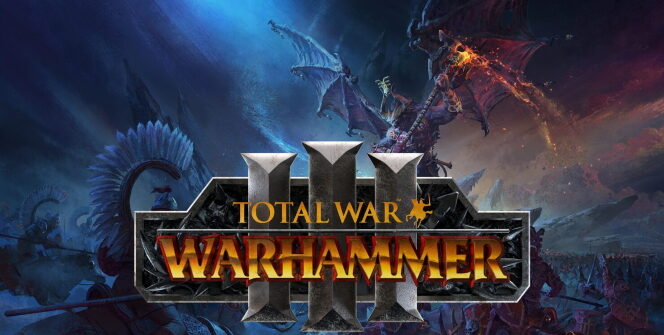
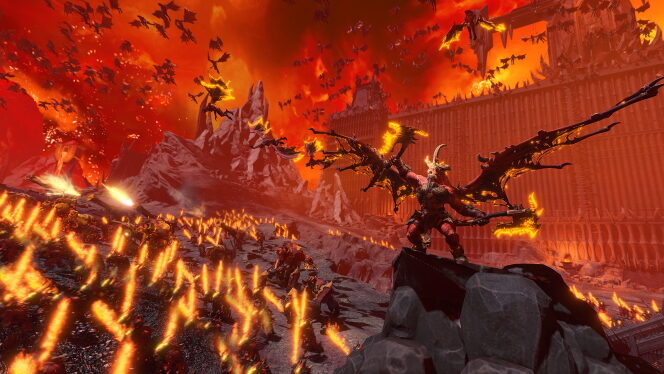
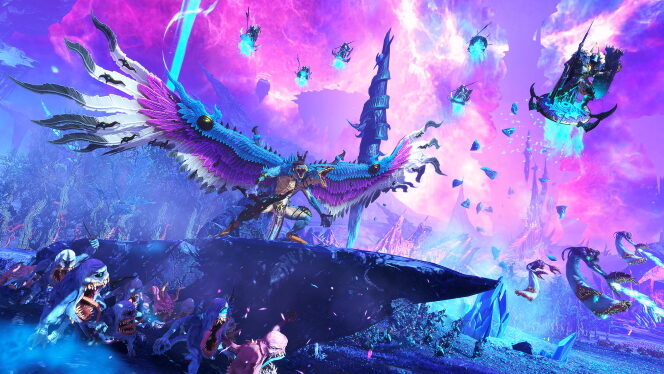
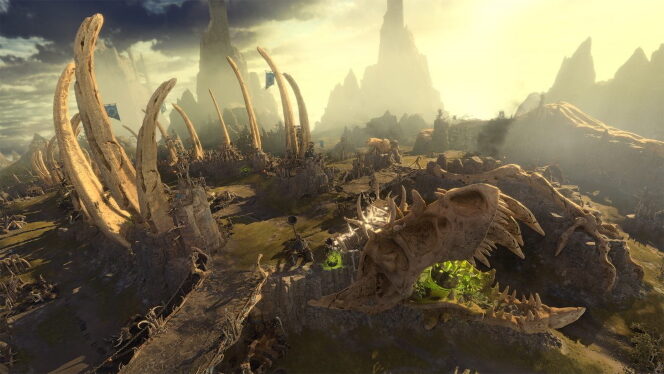
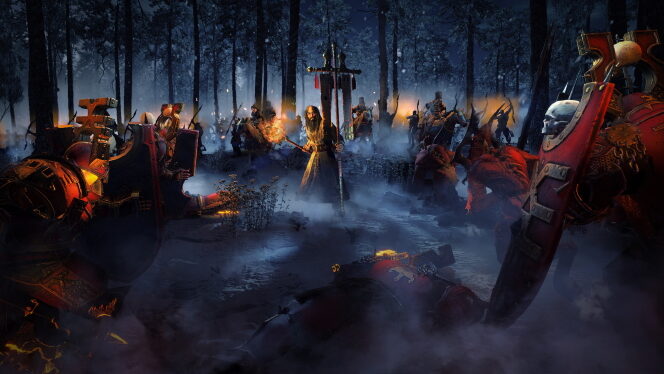

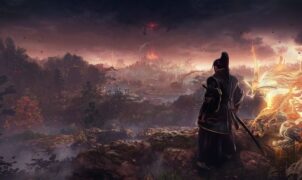





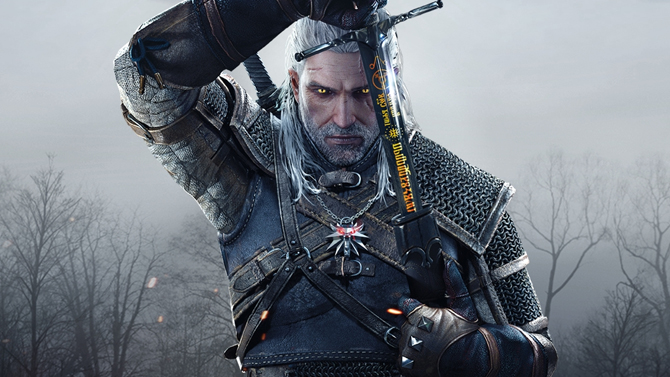
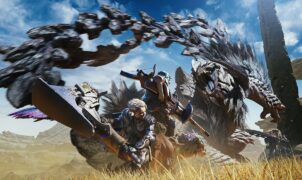

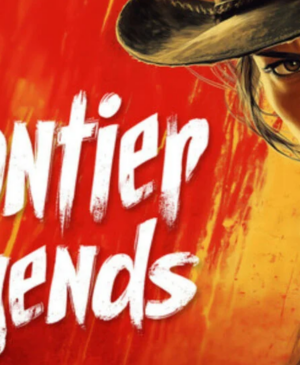
![[TGA 2025] Star Wars: Galactic Racer Focuses on High-Stakes Podrace Runs [VIDEO]](https://thegeek.games/wp-content/uploads/2025/12/theGeek-Star-Wars-Galactic-Racer-300x365.jpg)


Leave a Reply